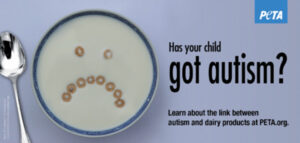Did PETA’s ‘Got Autism’ Campaign Really Go Too Far?

In yet another attempt to drive home the message that eating animal products is not only really unkind but unhealthy too, PETA’s (People for the Ethical Treatment of Animals) recently released a billboard with its ‘Got Autism’ campaign suggesting that cutting out milk can decrease autism symptoms. The backlash came quicker than you can take a sip of milk through a straw.
The PETA’s-at-it-again cries rung all across the Internet. Some of the headlines read in predictable PETA-bashing fashion:
“Got Credibility? Then You’re Not PETA” – TIME Magazine
“The Bad Science Behind PETA’s Claim That Milk Might Cause Autism”– The Wire
PETA: Milk Linked To Scary Autism And Vegan Is Your Only Hope” – Forbes
Had this information come from a reputable peer-reviewed journal instead of the most well-known/hated animal rights group, some of these headline would have likely been much different. Just imagine:
“Autism Link Found: Stop Drinking Milk!”
“Under Our Noses this Whole Time: The Milk and Autism Connection”
“Is Ice Cream Causing Autism?”
Autism is, understandably, a touchy subject. It scares all parents-to-be. According to recent data, one in 68 children now suffers from some sort of autism spectrum disorder; the number is up significantly from just two years ago when it was one in 88, according to the Centers for Disease Control and Prevention.
A disease with no concrete cause and no cure is troublesome, particularly as the number of effected children rises. Doesn’t it deserve all the research and attention it can get—even, if some of that comes via PETA’s controversial tactics?
Jenny McCarthy, the celeb and author best known as the voice against vaccines, has convinced a legion of followers that vaccines caused her son’s autism. And countless other suspects are routinely targeted: chemicals such as endocrine disruptors like BPA, mercury, fluoride, pesticides and herbicides, processed food ingredients like artificial colors and flavors, gluten and GMOs.
Scientists continue efforts to find both cause and cure. And according to PETA’s controversial campaign, “More research is needed, but scientific studies have shown that many autistic kids improve dramatically when put on a diet free of dairy foods,” the organization wrote on its website. “One study of 20 children found a major reduction in autistic behavior in kids who were put on a casein-free diet (casein is a component of cow’s milk). And another study done by researchers at the University of Rome showed a “marked improvement” in the behavior of autistic children who were taken off dairy products.”
But the media didn’t seem to care about the science that PETA referenced. The critics were more incensed by the ad, which read “Got Autism? Studies Have Shown a Link Between Cows Milk and Autism.” The text was accompanied by a sad face bowl of Cheerios in milk (pictured at top). The critics said the organization shamelessly used people with disabilities to push its vegan agenda. How dare those vegans.
But TIME, Forbes, The Wire and the rest of the PETA-bashers…don’t they have agendas too? Aren’t they just as invested in getting people to click on a story by discrediting the many theories and studies that suggest there are significant health benefits to a vegan diet, whether in the case of autism or not?
PETA is routinely the target of such criticism—and make no mistake—in most cases the organization has taken every step possible to ensure it will be put in that position. The brains over at PETA are masters at doing whatever it takes to bring the vegan discussion to as wide an audience as possible (and I’m telling you from personal experience, there are some highly intelligent employees in the organization). Yes, that means there will be almost naked ladies wearing lettuce leaves serving veggie hot dogs in Times Square; and celebs wielding undercover footage showing egregious animal abuse; and outrageous anti-fur campaigns in the dead of winter in hopes of making people ditch their coats and walk home freezing, but with a clear conscience. And it means discussing autism and the possible connection to dairy products.
Did PETA stoop to a new low? Probably. Until the next one. But why do we even care? Is that reaction going to cure autism? Is it going to magically make dairy products pristine and pure and a categorically healthy choice for everyone?
I don’t need to answer those last few questions because we already know the answers.
Autism isn’t going to be cured overnight. And we’re not going to see the widespread animal abuse, misuse of antibiotics and growth hormones removed from the dairy industry overnight either.
What PETA reminds us is that what we eat is really important, whether we eat dairy products or not. And in most cases, we simply don’t know enough about the foods we eat. Because food is no longer just plain old food. It’s the chemical fertilizers in the soil and the pesticides and the GMOs and hormones fed to animals and the food coloring and flavor enhancers and sugars and artificial sugars and the plastic in the bottles and packages food comes in. Much of our food is a process, part of a system where so many factors need to be considered. Will we find the cause or cure for autism there? We’ll never know unless we all agree it’s time to look, whether we’re vegan or not.
Find Jill on Twitter @jillettinger
Related on Organic Authority
11 Chemicals Creating ‘Global, Silent Pandemic’ of Autism, ADHD and Dyslexia, Study Finds
Probiotics Show Potential in Treating Autism Symptoms
Monsanto’s Roundup Herbicide Linked to Obesity, Cancer, Heart Disease and Autism

